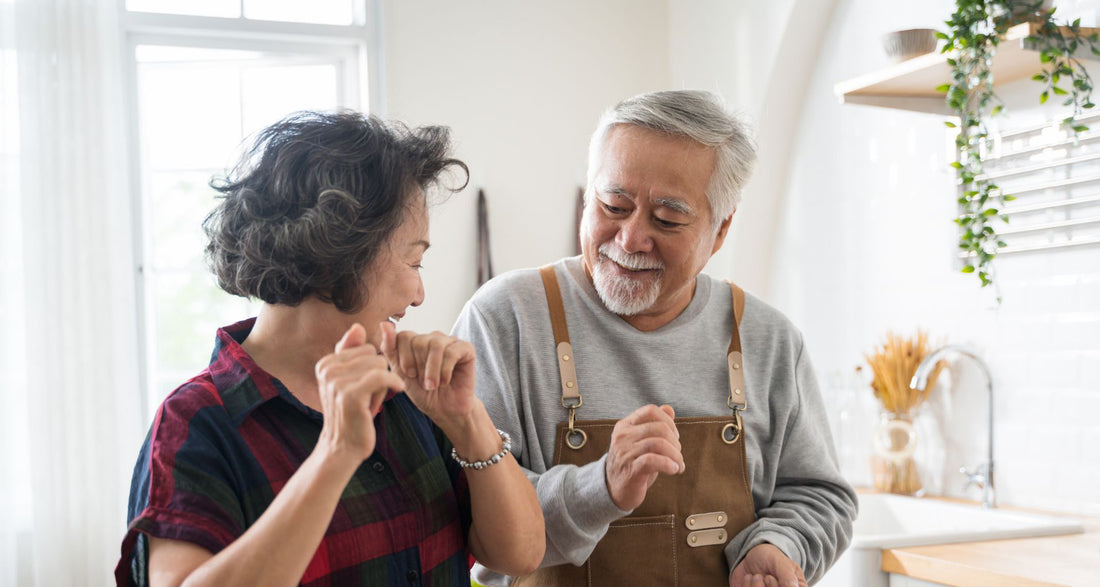Over 6 million Americans are estimated to have dementia. Caused by the damage or loss of nerve cells in the brain, it is characterized by a diminished capacity for thinking, remembering, and decision-making. It can even affect one’s ability to perform everyday activities.
The most common form of dementia is Alzheimer’s disease, a progressive condition that worsens over time.
As Alzheimer's disease is a progressive condition that worsens over time, more and more people are actively seeking ways to bring happiness to their loved ones who are affected by dementia. So, choosing the perfect Alzheimer’s gifts or engaging activities has become increasingly important.
If you’re looking for gifts for Alzheimer patients, you’ve come to the right place. We’ll help you come up with thoughtful and compassionate gift ideas at different stages of the condition.
But before we do, let’s think about the best gifts for dementia patients and how they can help the individual.
Importance Of Choosing Relevant Gifts for Dementia Patients

Appropriate and carefully thought out gift ideas for dementia patients are not only useful. They also show empathy and respect for the patient’s unique needs and experiences.
So, what makes great gifts for people with dementia? Take a look at some of the qualities to keep an eye out for:
Enhances Well-being
Thoughtfully chosen gifts for Alzheimer patients can contribute to their overall well-being. Relevant gifts provide them with a sense of purpose, engagement, and stimulation, helping alleviate feelings of frustration, boredom, and isolation.
Fosters a Sense of Connection
The perfect gifts consider the individual's background, personal history, and interests. They can also be used to bridge the gap between their past and present. Ideal gifts for dementia patients encourage storytelling, reminiscing, and the sharing of experiences, fostering a sense of belonging and strengthening relationships.
Preserves One’s Identity
Dementia can erode a person's sense of self and identity. Choosing appropriate gifts that reflect their individuality, passions, and preferences affirms their continued worth and personhood.
Promotes Independence
Gifts for people with dementia can empower individuals to maintain a sense of independence and autonomy. Items that assist with daily tasks, memory aids, or organizational tools can help them navigate their environment more confidently.
Provides Sensory Stimulation and Comfort
Sensory gifts for dementia patients engage the senses. This may include soothing music, textured objects, or familiar scents that provide comfort and sensory stimulation. They can reduce stress, evoke positive emotions, and trigger happy memories, bringing moments of joy and familiarity.
They also have the potential to reduce agitation, anxiety, and restlessness while promoting calmness.
Gift Ideas for Early-Stage Dementia Patients

In dementia’s early stages, memory loss is the main symptom that a loved one with dementia will experience. They may forget recent events or lose items around the house. During this phase, thoughtful gifts for people with dementia can help maintain cognitive function and stimulate the senses. They can also foster a sense of purpose and joy.
Here are some ideal gifts during the first stages of dementia:
Activity Books, Puzzles, or Games
Activity books filled with brain teasers, word searches, or simple puzzles provide an entertaining means of enhancing cognitive function. Look for materials with large print and clear instructions to ensure accessibility. Similarly, puzzles and games, such as jigsaw puzzles or card games, not only entertain but also encourage problem-solving and strategic thinking. They help maintain cognitive abilities and promote social interaction with loved ones.
With the “On-The-Go" Activity Box from Always Home Connected, you don’t have to choose between word games, board games, art projects, and stress-reducing items like fidget spinners. This activity box has it all. Plus, it comes in a lightweight nylon bag so you can keep everything in one place.
Memory Aids and Reminders
The biggest loss that a person with dementia must contend with is the forgetting of precious memories. When dementia begins manifesting, one of the best gifts you can give are items that help their memory.
Items like digital photo frames showcasing cherished moments or wall calendars with important dates and events highlighted are sure to be cherished. Personalized memory books poignant ways to help them record past events and remember them.
Sensory Stimulation Gifts
Sensory gifts for dementia patients offer comfort, relaxation, and engagement in early-stage Alzheimer's. Consider items such as scented candles, essential oils, or soft blankets with different textures. Music also has a remarkable ability to transport the mind. Personalized playlists or soothing melodies can thus be precious gifts.
If you want dementia-friendly gifts that stimulate the senses, Always Home Connected makes it easy with this Individual Activity Box that comes with 10 different activities. It will help your loved one engage in music therapy and art therapy as well as dexterity, movement, and logic exercises.
Gift Ideas For Middle-Stage Dementia Patients
When middle-stage dementia strikes, loved ones become more forgetful and often find it challenging to remember information. This could present difficulties in planning, decision-making, and problem-solving. They may also forget certain people.
At this stage, the following Alzheimer's gifts can help:
Simple and Engaging Games
Choose games that are easy to understand and play, with large, clear instructions and pieces. Card games with simple rules and large-print cards can also provide enjoyable and interactive experiences. Games like bingo or dominoes can engage multiple players and encourage social interaction. The key is to select activities that promote a sense of accomplishment and enjoyment without overwhelming the individual.
Check out the simple and engaging Qwirkle Game where participants must match colors and tiles. To stimulate passive thinking, consider our Pickles to Penguins game. The Bunco Dice Game is also a good idea if you just want to have fun without any pressure. You can find dementia toys suitable for every stage of the disease, taking into account the individual's personality and preferences
Simple Music Players for Nostalgic Music
Music can evoke emotions and memories. Consider gifting a simple music player, such as an MP3 player or a digital music player with preloaded nostalgic songs from the individual's era or favorite genre. Ensure that the device has intuitive controls and a clear display for easy use. By providing access to familiar melodies and cherished tunes, you can create moments of joy, nostalgia, and connection. It offers patients a comforting respite from the challenges of middle-stage dementia.
Gift Ideas for People With Late-Stage Dementia

Late-stage dementia poses unique challenges as individuals may have significant cognitive and functional impairments. When selecting gifts for people in this stage, it is crucial to prioritize safety, simplicity, and activities that can provide sensory stimulation and a sense of comfort.
Arts and Crafts
While individuals in the late stages of dementia may have limited cognitive abilities, simple arts and crafts activities can still provide moments of engagement and creative expression. Consider gifts like large, easy-to-grip paint brushes, non-toxic watercolor paints, or chunky crayons for individuals with motor impairment. Paper collage kits with pre-cut shapes and adhesive backing can also offer a sensory-based outlet for creativity. The focus should be on the process rather than the final result, allowing individuals to enjoy the tactile sensations and colors.
Ideal for all stages of dementia, our “On-The-Go” Activity Box houses several games and art projects that keep your loved ones engaged. Since it comes in a lightweight nylon bag, you can easily take it with you and keep all the items inside together.
Sensory-based Activities
In the late stages of dementia, sensory-based activities can be particularly meaningful and soothing. Look for gifts like soft plush toys or textured sensory balls for tactile stimulation. Sensory blankets or lap pads with various textures, colors, and materials can provide comfort and sensory exploration. Consider our sensory fidget blanket to provide tactile stimulation while keeping patients engaged.
Music instruments like bells, shakers, or drums may also elicit responses and enjoyment.
Remember to prioritize safety by choosing items with no small parts. You should also ensure that they are durable and easy to clean.
Considerations for Choosing Dementia-friendly Gifts
Regardless of the stage of dementia, certain considerations remain essential when choosing gifts.
Safety and Simplicity in Design
Opt for gifts that are safe and easy to use. Avoid items with sharp edges, small detachable parts, or complicated instructions. Choose products with clear and intuitive designs, focusing on simplicity and minimizing frustration. Ensure that the materials used are non-toxic and durable.
Personalization and Individual Preferences
Always consider the individual's interests, hobbies, and personal preferences when selecting gifts. Items that resonate with their past experiences or favorite activities can evoke positive emotions and enhance engagement. Tailoring gifts to their unique tastes can create a sense of familiarity and comfort.
By offering a present thoughtfully tailored to the journey of dementia, we can instill a sense of belonging, affirming our loved ones’ continued worth and importance even as their memories begin to falter.
As a specialized Alzheimer's store, Always Home Connected helps you embark on this gift-giving journey and make a positive impact in the lives of those affected by dementia. Together, we can bring smiles, create connections, and enrich the lives of our loved ones.
